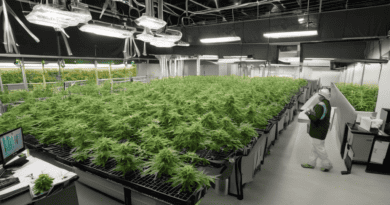Navigating Regulatory Challenges and Legal Developments in the Cannabis Industry
FDA Scrutiny and Regulatory Compliance in the Cannabis Industry
The cannabis business sector continues to be closely watched by regulatory agencies, reflecting the complexity and rapid development of this evolving market. A recent example is the FDA’s action against Naternal, a company selling CBD, CBG, and CBN products. The FDA issued a warning letter to Root Bioscience Brands LLC, operating under the name Naternal, criticizing them for promoting unproven claims about the efficacy of their products in treating various diseases in both people and pets.
According to the FDA’s findings, Naternal’s offerings were classified as unapproved new drugs and misbranded, thus violating key sections of the Federal Food, Drug, and Cosmetic Act (FD&C Act). This move by the FDA highlights the ongoing scrutiny cannabis companies face in ensuring their products and marketing methods are compliant with federal regulations.
State Regulatory Developments and Legal Challenges
Significant regulatory updates are also occurring at the state level. In Illinois, the recent clarification of rules permitting dual-purpose dispensaries to sell products from social equity licensees to medical patients aims to improve access to medical cannabis. This development is seen as a progressive step in supporting social equity initiatives and expanding patient access to therapeutic cannabis solutions.
Meanwhile, Kentucky received an overwhelming response to its medical cannabis program, with over 2,600 applications for licenses. This surge in applications highlights the increasing interest and demand within the state for legal medical cannabis.
Legal battles are intensifying in states like Arkansas and New York, where hemp manufacturers and retailers are challenging stringent laws and enforcement actions. In Arkansas, manufacturers of hemp-derived intoxicants argue that the state’s restrictions are unconstitutionally vague. Similar disputes are taking place in New York, where hemp retailers are seeking a preliminary injunction to prevent raids by state and city officials, underscoring the regulatory tensions in these jurisdictions.
Changes in Corporate Policies Reflecting Cannabis Trends
Beyond regulatory updates and legal challenges, corporate policies are also adapting to the changing landscape of cannabis use. Home Depot, for example, has announced significant alterations to its drug testing policies. The company will no longer conduct cannabis screenings or pre-employment drug testing for most new hires. This policy change represents a broader shift in corporate attitudes towards cannabis use and signifies a growing acceptance of cannabis as part of normalizing workplace practices.
The FDA’s recent actions against Naternal underscore the need for cannabis companies to prioritize regulatory compliance to mitigate the risk of legal repercussions. Ensuring adherence to federal guidelines is essential for maintaining market credibility and consumer trust.
Moreover, the FDA’s focus on consumer safety issues, particularly concerning unproven health claims associated with CBD products, continues to be a paramount concern. These measures are crucial in protecting consumers from potential risks and misinformation.
Overall, the cannabis industry is navigating a dynamic regulatory environment characterized by ongoing state-level updates, legal disputes, and evolving corporate policies. Companies must remain vigilant and proactive in their compliance efforts to thrive in this continually shifting landscape.




